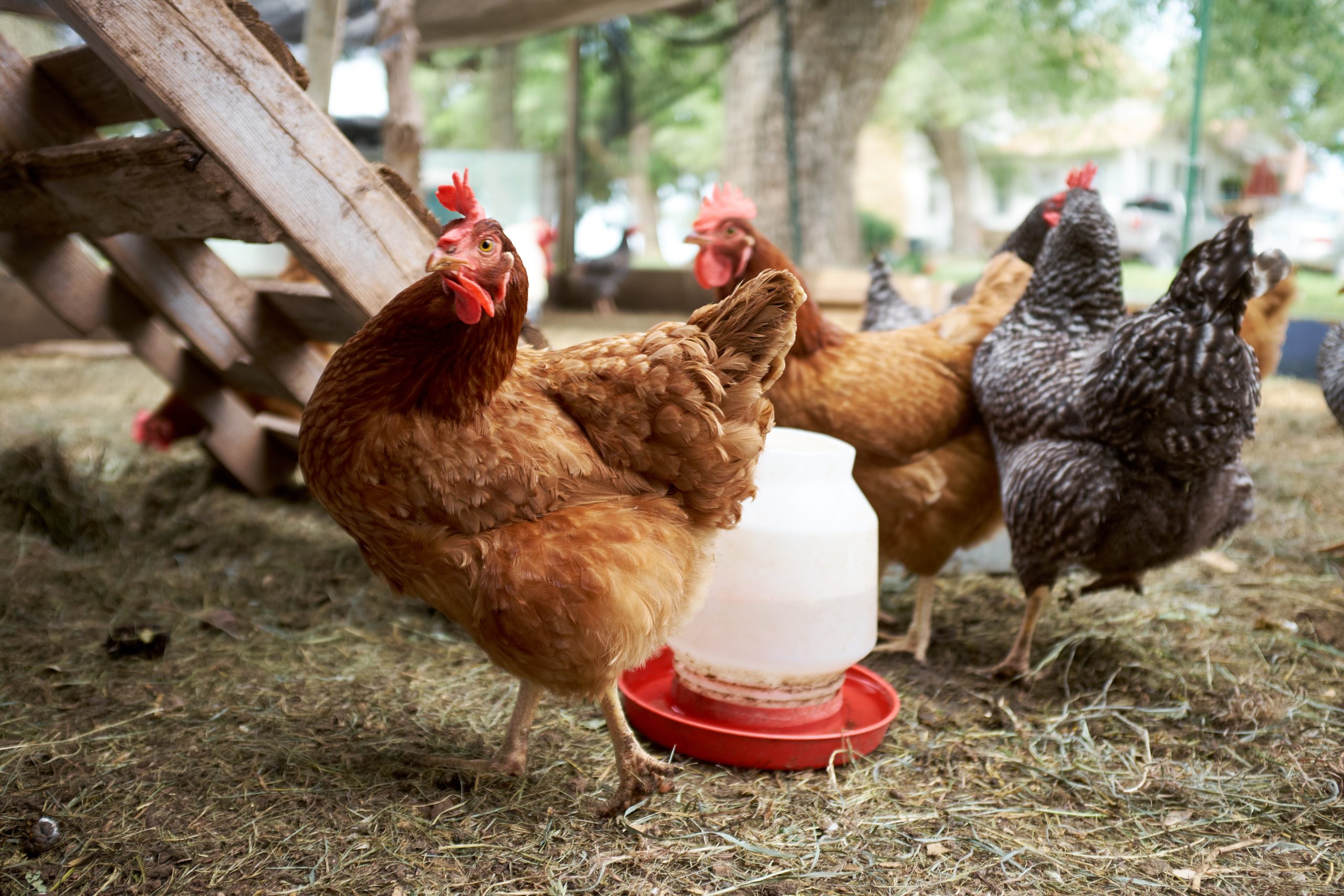Your chickens are here and you want to provide them with the best possible life. But, you may feel overwhelmed with all of the coop equipment that you see. What do your chickens need and what’s a waste of money? Let’s talk about what your chickens need in the body.
A Feeder
Your chickens will need a feeder. Although you could get by with an ice-cream bucket full of feed for a while, eventually you’ll want to invest in a good quality feeder. Look for a feeder that is easy to clean and will last a long time. Stainless steel feeders are easy to clean, hold up well to being sanitized and will last a long time. They also won’t break down when exposed to sunlight like plastic feeders will.
You’ll also want to invest in a high-capacity feeder that can be hung off of the ground. The top of the feeder should be pointed or slanted to discourage chickens from roosting on it. Hanging feeders off of the ground will prevent water, dirt and debris from getting into the feed. A high capacity feeder will make it easier for you to keep plenty of feed in front of your chickens.

A Waterer
Just like a feeder, you’ll need a waterer. Chicken waterers are designed to keep the water fresh and clean. When you put water into a bucket for your chickens, they may get in the water and make it dirty. Chickens are also bad about roosting on the side of a bucket and either knocking it over or pooping in the water.
Both of these issues can be avoided by investing in a waterer. Similar to a feeder, look for a design that is high-capacity, easy to clean and has a top that will prevent chickens from roosting on it.
Nesting Boxes
Your hens will appreciate the privacy that a nesting box gives them. Many hens won’t lay around other birds and will only lay eggs when they feel safe and secure. Nesting boxes can be bought or built. They should have three sides and a top that is slanted to prevent roosting.
You’ll want to line your nesting boxes with shavings to provide a soft landing spot for eggs. Keep the shavings a couple of inches deep in the nesting box to prevent cracked or broken eggs.
Bedding
The floor of your coop should be lined with bedding. You should be picky about the bedding that goes into your coop. Use pine flake bedding. Don’t use cedar shavings since these can cause respiratory problems in your birds. Straw is also a bad choice for bedding. Not only is it not absorbent, but it can harbor mites that can affect your chickens.
You can use sand in the floor of the coop as bedding. Sand can be easily cleaned out with a pitchfork, leaving the clean sand behind.
Roosting Spaces
At night your chickens will roost. Chickens don’t sleep on the ground or on a flat surface. Instead, chickens prefer to roost on a round pole to sleep. A 2” rod is the ideal roost size for most chickens. You can easy add roosts to almost any coop with round rods or tree limbs that you trimmed. When adding roosts to your coop, put the roosts above the level of the nesting boxes. Chickens want to roost on the highest possible point.
Feeder for Calcium and Grit
Your chickens will need constant access to calcium and grit. Hens need their diet to be at least 2-3% calcium. Most chicken feed will contain calcium, but it’s always a good idea to have a supply of oyster shell or limestone for your chickens to eat. Simply fill a small feeder with either one and allow your hens to get it as needed.
Chickens don’t have teeth, so they rely on grit in their gut to physically break down food. Place grit into a small feed container and keep it full. Your chickens will take what they need to keep their digestive system working well.
Things you don’t need, but that are nice to have:
Treat feeders. Chickens that are fed a well-balanced diet don’t need treats. However, treat balls, blocks and other treats for chickens can be a great way to keep your chickens entertained.
Herbs. Chickens are very intelligent when it comes to eating things that keep them healthy. Many herbs that we use are also beneficial for your chickens. Consider planting herbs around the perimeter of your coop’s run so that your chickens can eat some of the plant without completely mowing it down. Some beneficial herbs to plant for chickens include oregano, thyme, citronella, lavender and rosemary.
Automatic coop door opener. Chickens are the safest when they are locked up in the coop at night. It may not seem like a big task to lock your chickens up in the evening, but have you noticed what time your chickens get up in the morning? They’re ready for the day well before dawn. If you go out to the coop at first daylight to let them out, you’ll probably notice that they seem like they’ve been waiting for you! An automatic door allows your chickens to be let out and put up safely, without you having to walk out to the coop and do it yourself.
There are many things that you can find for your coop, but not all of them are things that you need. Start by buying quality basics: feeder, waterer, nesting boxes and feeders to hold grit and calcium. Once you’ve gotten the basics, you can start spoiling your chickens with treats, herbs, automatic doors and other fun equipment.